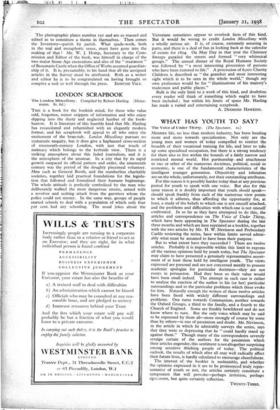WHAT HAS YOUTH TO SAY?
The Voice of Under Thirty. (The Spectator. is.) MODERN life, no less than modern industry, has been heading more and more towards specialisation. Not only are the young men and women of today compelled to restrict ffie breadth of their vocational training for life, and later to take up some specialised occupation, but there is a strong tendency for them also to live within the bounds of a fairly narrow and restricted mental world. Hot partisanship - and attachment to one or other of the numerous doctrines, political, social or economic, is one of the fundamental characteristics of the intelligent younger generation. Objectivity and toleration are on the whole, unfortunately, not their outstanding attributes.
For this reason it is possibly harder today than at any previous period for youth to speak with one voice. But also for this same reason it is doubly important that youth should speak— should speak frankly from each of the numerous view points to which it adheres, thus affording the opportunity for, at least, a study of the beliefs to which one is not oneself attached, and the problems and difficulties with which one is not oneself confronted. In so far as they have attempted to do this, the articles and correspondence. on The Voice of Under Thirty, which have been appearing in The Spectator during the last three months and which are here reprinted as a booklet, together with the two articles by Mr. H. W. Nevinson and Prebendary Carlile reviewing the series, have within limits served admir- ably what must be assumed to have been their purpose.
But to what extent have they succeeded ? There are twelve articles. Probably it is impossible within this limit to express all the various opinions held by youth today, but The Spectator may claim to have presented a genuinely representative assort- ment of at least those held by intelligent youth. The views expressed are personal and are not concerned merely to present academic apologias for particular doctrines—they are not essays in persuasion. Had they been so their value would have been small indeed. The attempt in each case is rather to analyse the reaction of the author to his (or her) particular surroundings and to the particular problems which these evoke for him. Naturally enough the writers of these twelve articles have been faced with widely different surroundings and problems. One turns towards Communism, another towards the Oxford Groups, a third to the family, and a fourth to the Church of England. Some are frankly bewildered and do not know where to turn. But the only voice- which may be said to be expressed by them all—more strongly of course by some than by others—is one of pessimism and doubt. Mr. Nevinson, in the article in which he admirably surveys the series, says that they were so depressing that he " could hardly stand up against them." Though many of the correspondents severely arraign certain of the authors for the pessimism which their articles engender, this sentiment is not altogether surprising among sensitive thinking people of today. The political outlook, the results of which after all may well radically affect their future lives, is hardly calculated -to encourage cheerfulness.
The interest of the booklet is undeniable, and whether the opinions expressed in it are to be pronounces truly repre- sentative of youth or not, the articles certainly constitute a symposium that will provoke—perhaps irritation, perhaps agreement, but quite certainly reflection.
TWENTY-THREE.














































 Previous page
Previous page